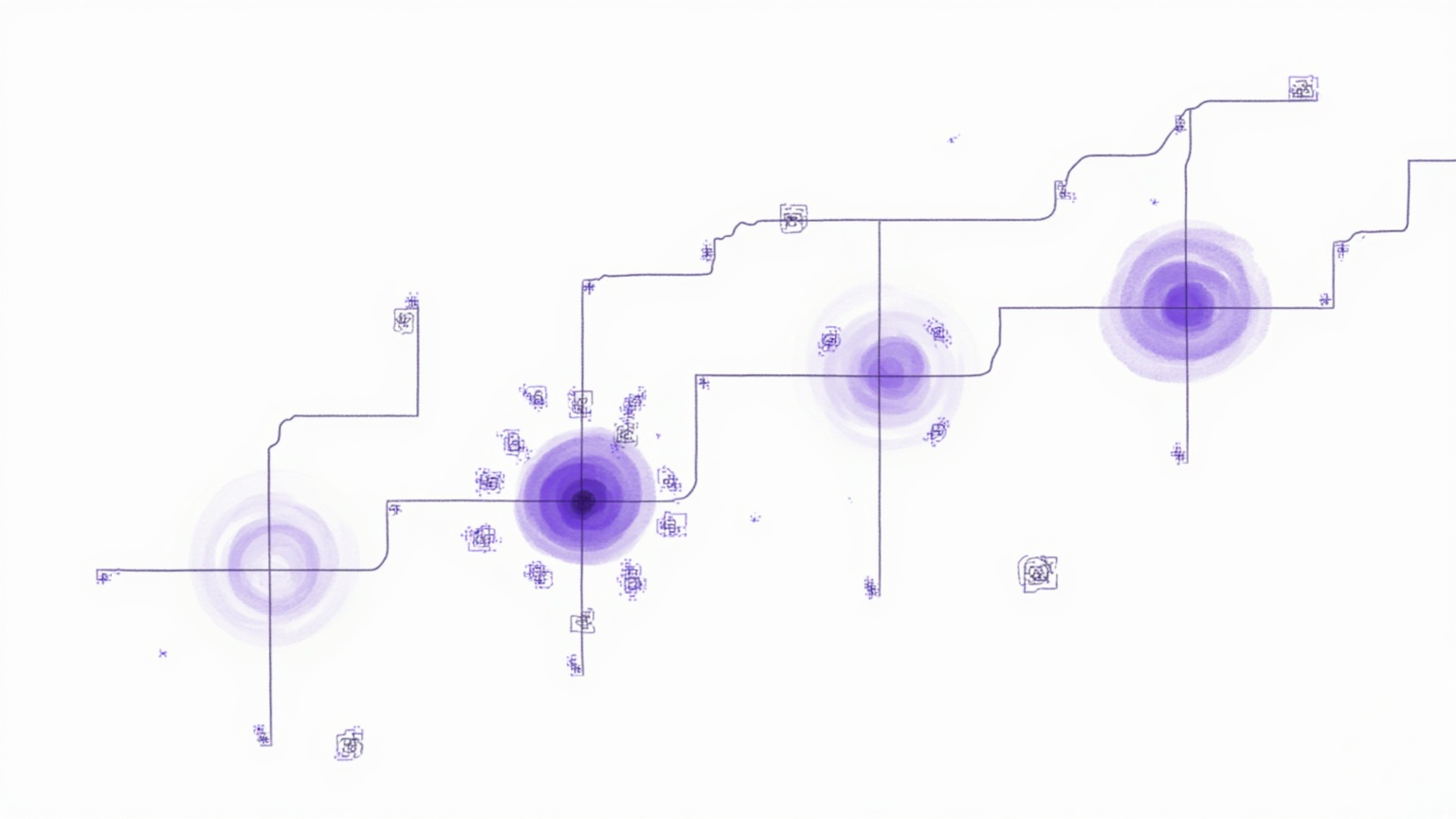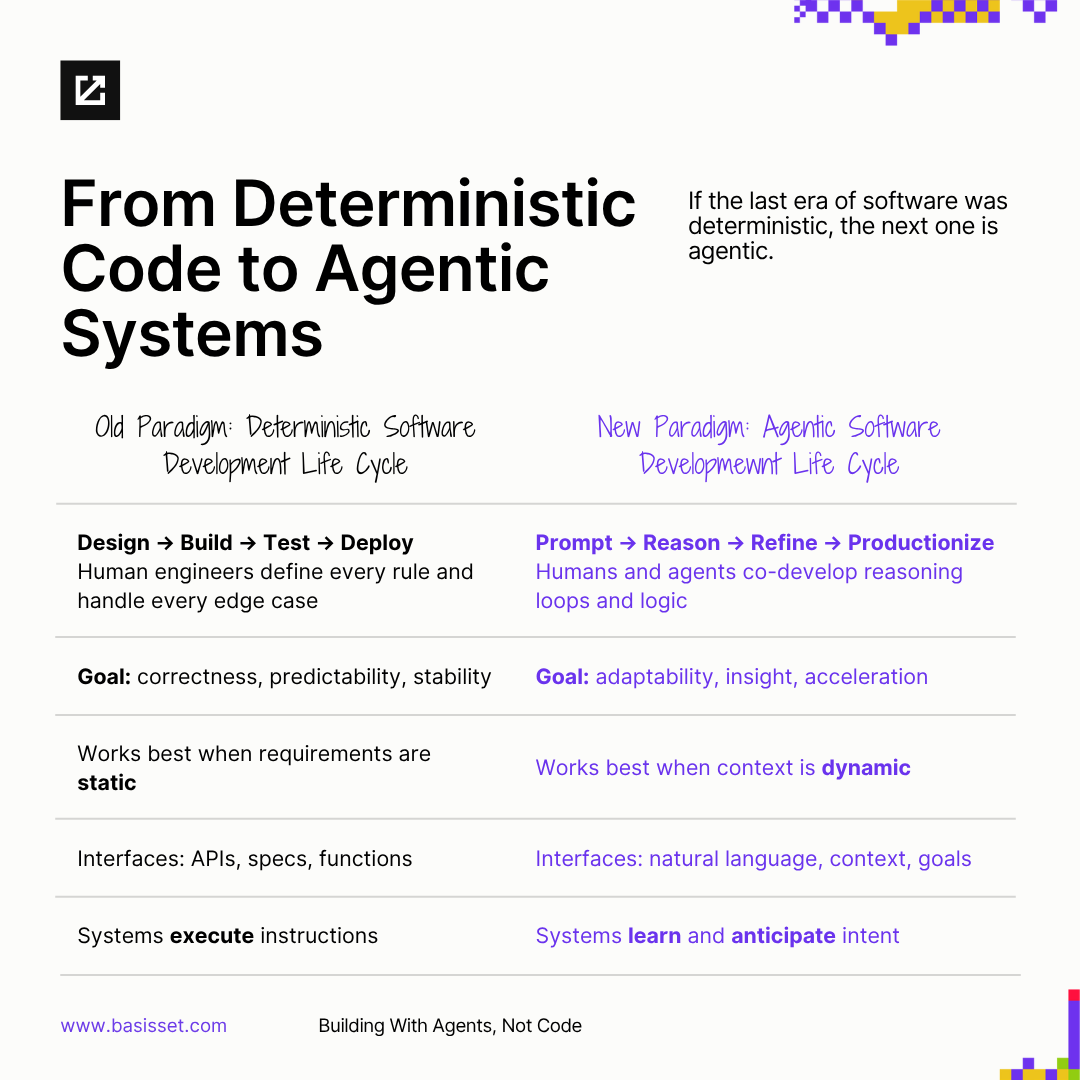Building With Agents, Not Code

October 7 2025
By Chang Xu
Every week we see the same debate: whether tools like Claude Code, Cursor, or GPT-based dev environments can actually produce “production-quality” code.
The frustration is real. These tools still struggle with large codebases, state and edge cases. But that whole conversation misses what’s actually new here.
We’ve been building real systems with these tools for years. The unlock is faster coding yes, but below the surface it’s building reasoning systems that connect data, analysis and action. Agents handle the kind of integrative work that used to take teams hours of coordination and judgment in minutes.
We use Claude Code to write code. But we also use it to structure logic and intent, and to orchestrate agents that adapt and learn. That shift, combining automation and reasoning, changes both how we build and how we think.
This post is about what that shift means: how agentic systems create leverage, how they reshape work itself and how any team can start building this way.
From 10× Automation to 1000× Leverage
Most people still see AI as workflow automation. Given enough time, you can automate almost anything: scraping data, drafting memos, updating CRMs. It saves time, gets you 10× efficiency and that’s great.
But there is an even bigger step change. The elusive question is: what’s the most strategic part of my job, and how can I partner with AI to multiply its impact?
In venture, the most strategic part of the job is judgment — deciding who and what to back. That’s where we use agentic systems: to interrogate data, surface blind spots and codify how conviction is built. Once reasoning becomes explicit, it becomes improvable. Every time you make your thought process visible, you create a feedback loop that compounds.
And once you can codify your thinking, new possibilities open up. You can simulate different “tastes,” backtest decisions, borrow expertise and drastically shorten the feedback loops that make it difficult to improve in venture.
The same pattern applies everywhere:

Automation gives you speed. Reasoning gives you leverage.
The Shift from Deterministic to Agentic
Traditional software is deterministic. Every input is defined, every output predictable, every failure handled manually. That foundation still matters, but agentic systems work differently.
Agentic systems reason and act in context. They hold more states, process more nuance and adapt as they go. Expecting them to behave like another engineer, precise, testable, and consistent, is a limited lens.
Treat an AI tool like autocomplete and it might frustrate you. Treat it like a reasoning partner and it changes what’s possible. It can hold enormous context, never tire and run logical loops until new insights emerge.
Even the best software architects eventually hit cognitive limits. An AI doesn’t. It can track the whole system in real time and synthesize across it.
These systems expand what’s possible when humans and machines reason together. Organizations that adopt this mindset evolve differently. Teams stop compounding tasks and start compounding thinking. Over time, that advantage becomes cultural, not just technical.
A New Software Development Life Cycle

The old software life cycle was linear: design, build, test, deploy.
The new one is iterative: prompt, reason, refine, productionize.
We don’t start with specs; we start with hypotheses. We express them in natural language, test them with agents and see what holds up. The system handles inconsistencies, merges sources and often takes the next step we hadn’t thought to ask for.
It feels less like coding and more like co-developing with a reasoning partner. Natural language becomes the interface for logic, the bridge between intuition and machine judgment.
That’s what it means to be AI-native: not just that you use AI, but that you think with it.
The Mindshift
It’s easy to measure AI tools by old standards — “they hallucinate or don't,” “they’re not deterministic,” “they can or can't ship production code.” All reasonable, but beside the point.
The real unlock is creative leverage. Once you start building this way, you stop thinking in prompts and start thinking in feedback loops that learn, improve and scale.
The power is in automation, but it's also in the system that reasons alongside you, sharpens your logic and compounds your thinking in real time.
If the last era of software was deterministic, the next one is agentic. And the builders who internalize that shift first, not just as users, but as architects of new kinds of systems, will define the next decade.
What excites us most isn’t just the efficiency, it’s the creativity that AI unlocks. Every time we build a reasoning loop that works, it feels like play. We start to see new patterns, new possibilities and new points of leverage.
This isn’t just about us or about venture. This is where every high-performing organization is headed. We just decided to start now, to learn by doing and see how far our thesis can go.